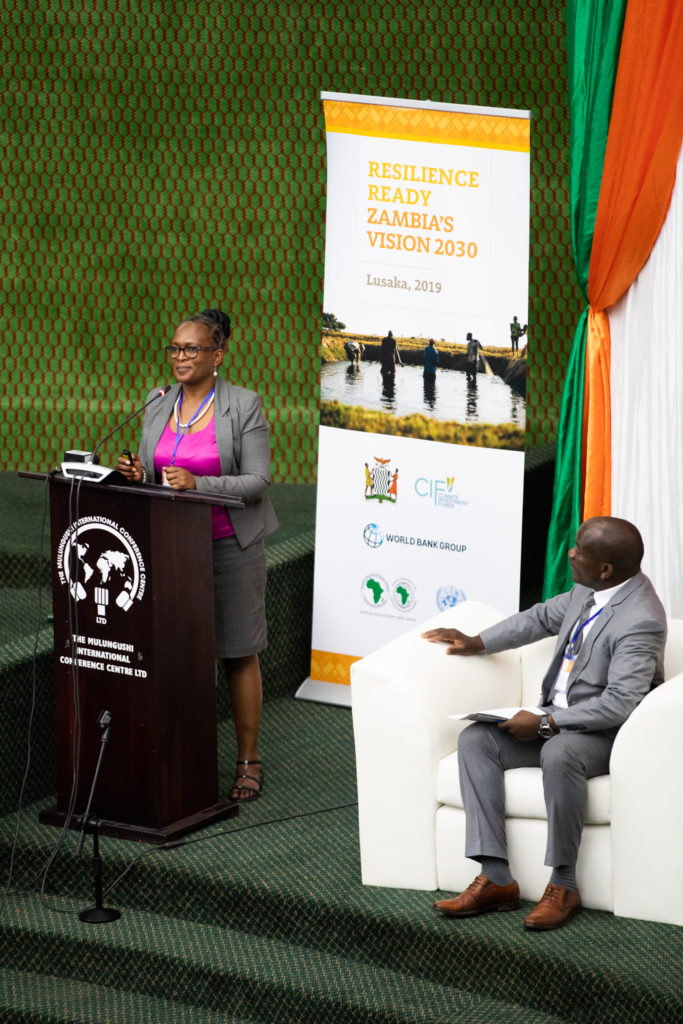The Government of Zambia, with support from the Climate Investment Funds’ Pilot Programme for Climate Resilience (PPCR), has been successful in advancing climate-resilient development. Through the Pilot Program for Climate Resilience (PPCR), Zambia has been able to climate-proof its infrastructure, improve climate information services, and build the climate resilience of rural populations along the Kafue and Barotse sub-basins of the Zambezi River.
To share the lessons from the PPCR experience and bring the voices of all the partners that have contributed to its success, the government of Zambia held a “Climate Resilience Mainstreaming” conference on the 4th – 6th November 2019 under the theme “Resilience Ready – Zambia’s Vision 2030” at the Mulungushi International Conference Centre, Lusaka, Zambia. This event provided an opportunity for the task team supporting the new national UN CC:Learn project to collect insights from the 10-year PPCR implementation as well as brief all participants on the development of the National Climate Change Learning Strategy of Zambia, as a key instrument to promote the implementation of the Nationally Determined Contribution (NDC) and the National Adaptation Plan (NAP), and ultimately strengthen climate resilience in the country.

The event brought together stakeholders from government, private sector, community, and international development professionals to encourage deeper engagement and urgent action on adaptation and enhance private sector investments in resilience.
The 2.5-day workshop was attended by over 200 participants, which included four Ministers (including the Minister of National Development Planning and Minister of Land and Natural Resources), over 20 Members of Parliament, and many other senior officials including Permanent Secretaries and Directors.

Key highlights from the workshop included:
- A strong recognition of climate change impacts in Zambia – heavier rains, more frequent droughts, extreme temperatures have brought negative impacts on livelihoods, health and poverty. The country suffers a severe lack of water due to insufficient rainfall in the past 3 years. Last summer, there have been severe power outages (up to 15 hours every day) due to Zambia’s dependence on hydro-power and a drought in southern and western Zambia. The impact on businesses, health and overall welfare was palpable and was a core underlying theme throughout the workshop.
- A focus on systemic change, scale and sustainability. Day 1 of the workshop focused on sharing lessons from the PPCR experience in Zambia through speakers from the MNDP, CIF, World Bank, and the AfDB. The speakers underscored the importance of resilience mainstreaming, cross-ministerial collaboration and learning, continued stakeholder engagement, and community driven participatory approaches.
- An impromptu exchange during the workshop led by Permanent Secretary of MNDP, Mr Chola Chabala, with his department heads led to sharing of status updates on resilience mainstreaming across ministries.
- A focus on how to encourage private sector investments in resilience efforts (Day 2). Participants from PPCR in Bangladesh, Nepal, Niger, and Tajikistan shared models of success from their respective countries which led to several questions about the potential to replicate these successes in Zambia. Representatives from the Zambia private sector also participated in the conversation and shared their insights on the barriers and opportunities to create stronger business incentives in adaptation and resilience.
During Day 3, the UN CC:Learn team presented the project and share the early findings as part of the development of a National Climate Change Learning strategy. This was very timely as several interventions throughout the workshop related to the need to mainstream learning about climate change and resilience in academic institutions.


The workshop was captured through a video

